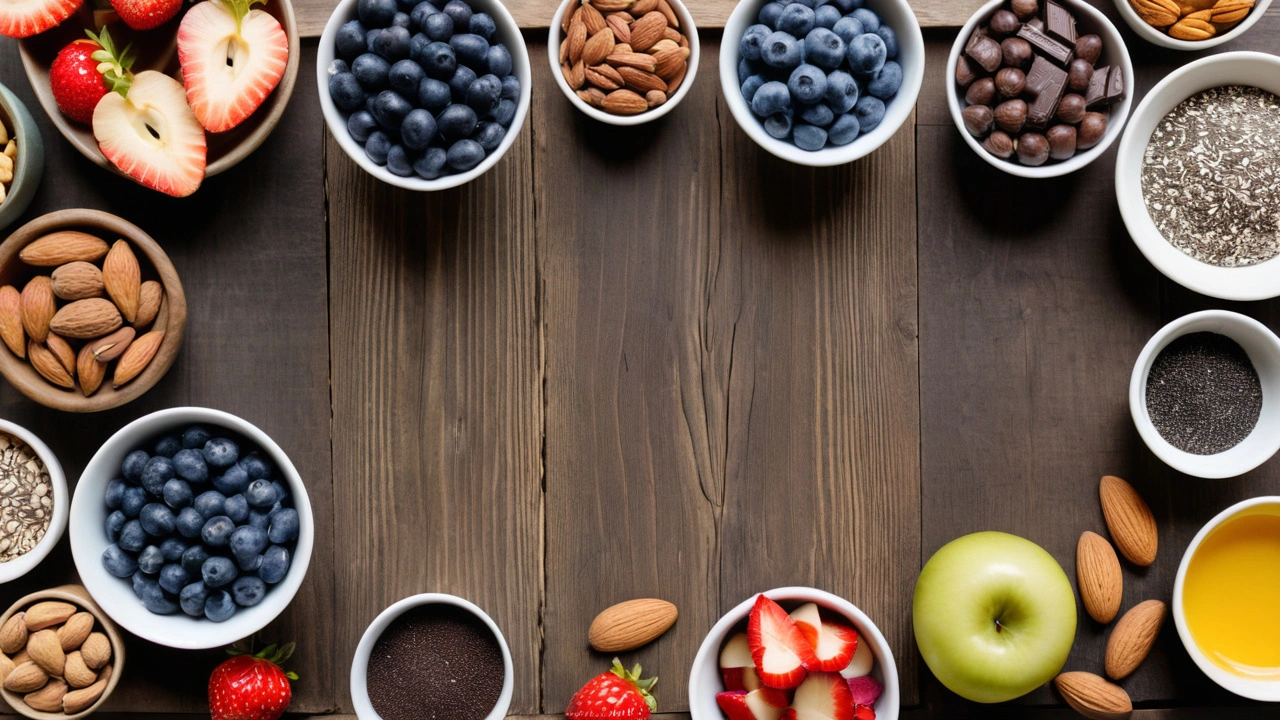Brain Food: Feed Your Focus and Memory
Brain food matters. The right mix of nutrients fuels focus, memory, and steady mood. You don't need exotic powders — common foods do the job. Here's a clear, practical guide to what to eat, when to eat, and quick combos you can use every day.
What to eat
Start with protein plus healthy fats. Eggs, Greek yogurt, and salmon give amino acids and omega-3s that support neurotransmitters and brain cell repair. Add berries for antioxidants; blueberries and strawberries protect brain cells and help recall. Leafy greens like spinach and kale supply folate and vitamin K for memory. Nuts and seeds offer vitamin E and steady energy — try walnuts, almonds, chia, or flax. Whole grains and oats release glucose slowly, keeping focus without sugar crashes. Fermented foods such as yogurt, kefir, or sauerkraut support gut bacteria that talk to the brain, helping mood and cognition. Drink water; even mild dehydration blunts attention. Moderate coffee or green tea can boost alertness without jitters if you time it before heavy tasks.
Quick daily plan
Breakfast: scrambled eggs with spinach, a handful of berries, and oatmeal with chia seeds. Mid-morning snack: apple slices with almond butter. Lunch: grilled salmon or chickpea salad with mixed greens and quinoa. Afternoon pick-me-up: green tea and a small handful of walnuts. Dinner: roasted vegetables, a serving of oily fish or tofu, and brown rice. Night: if you need a late snack, plain yogurt with a few berries is gentle on sleep and digestion.
Replace sugary cereals with oats and fruit. Swap potato chips for roasted chickpeas or mixed nuts. Trade soda for sparkling water with lemon. Choose whole fruit over fruit juice to preserve fiber and steady sugar levels.
Meal prep a jar of overnight oats or hard-boiled eggs for busy mornings. Pack single-serve nut mixes for travel or meetings. If you skip meals, keep a protein bar or yogurt on hand to avoid reaching for sweets. For kids, make berry and yogurt parfaits or whole grain pancakes with nut butter — they taste like treats and feed the brain.
If you eat a balanced diet but still struggle with focus, ask your doctor about omega-3 supplements or a basic multivitamin, especially if you follow a restricted diet. Testing for vitamin D, B12, or iron can reveal gaps worth fixing. Pick a few habits, not a perfect plan. Small, consistent food choices add up and make focusing easier tomorrow, not just today.
Short recipes you can try right away: a smoothie with spinach, banana, frozen berries, Greek yogurt, and a spoon of flax; a grain bowl with brown rice, roasted sweet potato, kale, chickpeas, and tahini; and baked salmon with lemon, served with quinoa and steamed broccoli. For busy mornings, microwave a scrambled egg mug with chopped veggies in two minutes. These recipes pack protein, fiber, and healthy fats to keep your brain running all day. Start small and stay consistent.

Boost Your Brainpower with These Nutrient-Rich Snacks
This article explores healthy snacks that can enhance cognitive functions and brain health. It includes delicious and nutritious options to keep your mind sharp throughout the day. Learn about how fruits, nuts, seeds, and other snacks can contribute to better focus, memory, and overall brain performance.
Read More